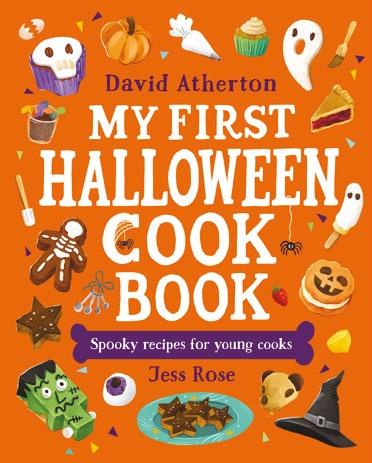

Is It Just a Phase – or Something More? Understanding the Early Signs of Autism
“Maybe they’ll grow out of it. They’re just sensitive. Aren’t we all a bit on the spectrum? Could it be my parenting... but something feels different.”
These are thoughts many parents have when they start wondering if their child might be neurodivergent. It’s natural to question what you’re seeing - and to doubt yourself. Children go through so many stages, and many parents worry about the impact of ‘labelling’ their child.
In this article, we’ll explore some of the early signs that often lead families to seek clarity around autism. We’ll also consider the decision to pursue an assessment, and why early understanding can make a real difference.
Autism Doesn’t Always Look How You Expect
Many people have preconceived ideas about what autism “should” look like, but in reality, it’s far more varied and complex. Some autistic children show clear, outward signs, while others internalise their difficulties or ‘mask’ to blend in. This can make their challenges harder to spot or understand.
An autistic child might manage well one day and really struggle the next, even with the same task. Their ability to cope can depend on the situation and their current emotional capacity.
Autism is often described as a spectrum, not a scale of severity, but a unique profile of strengths, differences, and support needs. No two autistic people are the same.
Early Signs Parents Often Notice
Every child is different, but here are some common behaviours that prompt parents to wonder if their child might be autistic:
• A strong preference for routine and sameness, and distress when things change or when asked to shift between tasks or activities.
• Intense emotional responses to situations others may find minor
• Rigid or ‘black-and-white’ thinking
• Difficulty picking up on social cues or navigating friendships
• Differences between behaviour at home and school (e.g., masking at school)
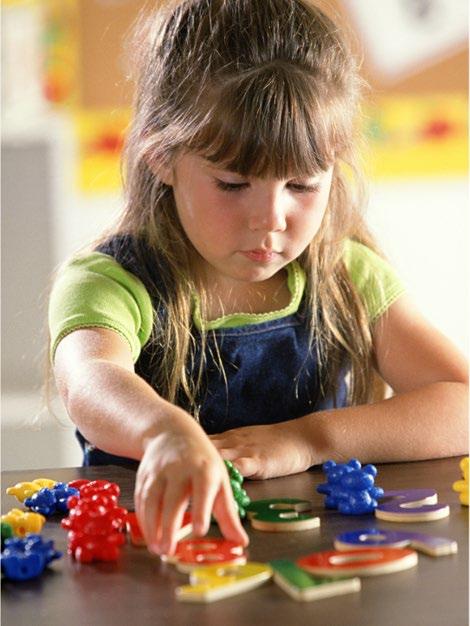
• Appearing ‘in their own world’ or being very controlling in play
• Sensory sensitivities or preferences (e.g., avoiding noise, picky eating, or seeking certain textures)
• Sleep or toilet training difficulties
• Heightened anxiety or needing things to feel ‘just right’
• Difficulty calming down or managing big feelings
• Delayed speech or language that sounds formal, like a ‘mini adult’
• Deep, focused interests that dominate play or conversation
You’re Not Imagining It
It’s easy to wonder if you’re overthinking things, especially if no one else has raised concerns. But you know your child, if something feels different, that instinct is worth trusting.
If a child’s behaviour were just personality quirks or a phase, it likely wouldn’t cause the level of difficulty or distress that many parents notice. Also, if a child’s difficulties were truly due to poor parenting, it’s unlikely those parents would be pursuing psychological help.
Considering an Assessment: What Families Face
Deciding to pursue an autism assessment is a big step. It can come with selfdoubt, uncertainty, or fear of judgment.

Parents often worry they’ll be dismissed, or that their child will mask during the appointment and not be ‘seen.’
Others worry about the label, or ask themselves: Will this even change anything?
But a diagnosis doesn’t change who your child is, it simply helps everyone understand them better and gives you the tools to support them more effectively.
Why an Assessment Can Help
• Self-understanding and validation: A diagnosis helps replace labels like ‘difficult’ or ‘lazy’ with insight. It affirms your child’s experience and helps them understand themselves better.
• Better support at school and home: Schools can tailor learning and support more effectively, and you can adapt routines to suit your child’s needs.
• Improved relationships: With greater understanding, families and teachers can communicate more effectively and reduce misunderstandings.
• Support for wellbeing and development: Understanding your child’s needs can reduce stress and anxiety and help them thrive emotionally and socially.
• Empowerment and advocacy: Knowing how their brain works helps children (and adults) ask for support and feel more confident in who they are.
• Finding community: A diagnosis can help you and your child connect with others who understand your experiences.
• Legal protections: Autism is recognised as a disability under UK law, offering protections and rights that may be important in school or work settings.
If you’re wondering whether your child might be autistic, you don’t need to have all the answers right now. Trust yourself to decide if and when taking the next step feels right for your family.
Seeking Support
Depending on where you live, you can speak to your GP to request a referral through the NHS.
If you’re considering a private assessment and would like to talk through your options, The Retreat Clinics offer gold-standard autism assessments and are happy to discuss what’s right for you and your child. www.theretreatclinics.org.uk

Welcome
We hope you all had a brilliant summer and are ready to take on the challenges of getting the kids back into the school routine again... remember it needn’t be the end to your family adventures! There’s plenty about the autumn season to like, including getting outside and enjoying all those autumn leaves.
In this issue, we have a bumper ‘back to school’ education feature. Not only is it the season for children to start or change school, it’s also the season for planning the future education of your child. You’ll find advice on weighing up the pros and cons of a state education versus that of a grammar or independent school in our feature inside. Plus support to help your child embrace the language of learning, how poor processing affects learning and the importance of music in child development.
Halloween and half term will be the next holidays to enjoy. So don’t forget to cut out and keep our great Halloween baking recipe from The Great British Bake Off winner, David Atherton. It’s sure to be frightfully yummy!
Finally, in this issue, we have lots of giveaways as usual. Apply inside.

Yorkshire are fully protected by copyright and none of the editorial or photographic matter may be reproduced in any form without prior consent of Families North Yorkshire. Every care is taken in the preparation of this magazine but the franchise owner and Families Print Ltd cannot be held responsible for the claims of advertisers, nor for the accuracy of the contents, or any consequence thereof.


Mastering positive learning language
By Zuzu Jordan
How many times have you found yourself in a standoff because your child says they ‘can’t’ do a challenging piece of homework? That word - ‘can’t’ - creates an immediate mental block. It shuts down part of the brain that could otherwise be open and ready to learn. One word can be powerful enough to shape the success of a learning journey.
What if we could help children use more open, hopeful language? What if the words they used gave them the confidence to try again instead of giving up? Let’s look at positive learning language. The way children talk to themselves - and how we speak to them - can completely shift their mindset and learning outcomes. Language is not just about communication; it shapes beliefs, emotions and behaviours. Here are some practical strategies to help develop this kind of language every day:
Acknowledge emotions first
To begin, acknowledge how your child feels. A simple: ‘I can see this is frustrating for you’ or ‘It’s okay to feel stuck sometimes’ can build safety and trust.
Ban the word ‘can’t.’
Replace it with: ‘I can’t do this yet’ or ‘I’m having difficulty with this.’ These phrases shift focus from finality to possibility, reminding children that ability grows with time and effort.
Start with what they know
Confidence grows when learners begin from a familiar place. Encourage the phrase: ‘Use what you know to figure out what you don’t.’ For example, using known multiplication facts to solve more difficult ones.
Break the task into steps
Ask questions like: ‘What can you already do?’ or ‘How can we make this easier by breaking it down?’ This helps children realise that progress often starts with small, manageable actions.
Remind them of past ‘wins’
Say: ‘Remember when this was tricky and now it’s easy?’ Reflecting on past successes helps children see that challenges are temporary and progress is possible.
Celebrate mistakes
Mistakes are mis-takes - opportunities to try again. Reframe
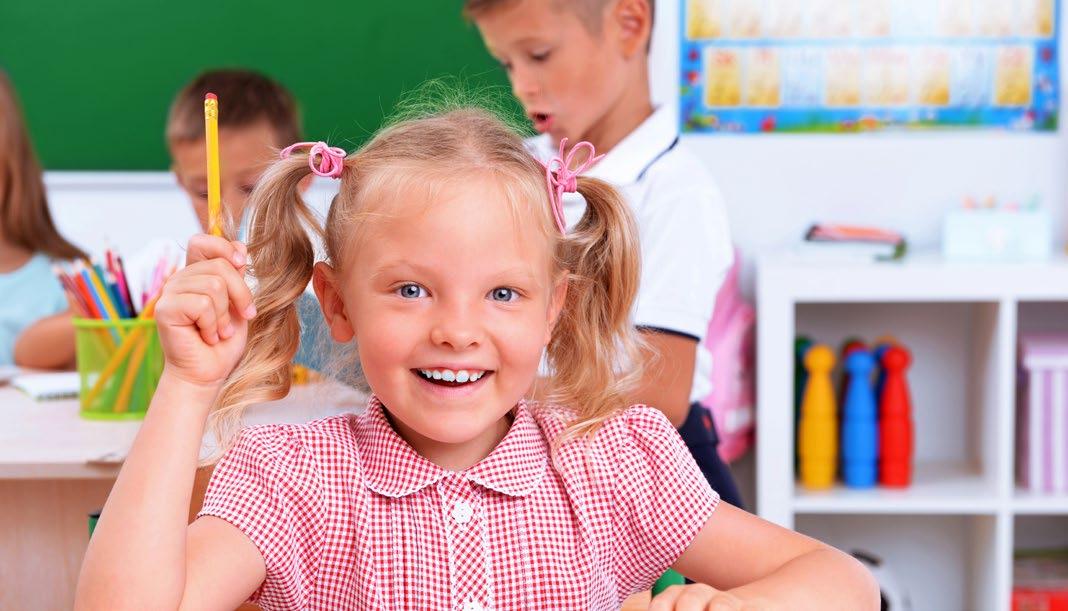
them by asking: ‘What can I learn from this?’ This teaches that every mistake brings a new chance to grow.
Practise positive affirmations
Affirmations such as ‘I don’t give up easily’ or ‘I can work this out’ help your child rewire negative thinking. Repeating them regularly supports resilience and self-belief.
Praise effort over outcome
Say: ‘I noticed how hard you tried’ and ‘You’re improving every time,’ even if the task wasn’t finished. This reinforces a mindset that values learning over perfection.
Use the ‘Three Bs’ Rule
Teach your child to check: Brain – think independently. Book –look for clues or previous notes. Buddy – ask a peer. Only then, ask the Boss (teacher or adult). This encourages independence and self-reliance.
Retrain how they ask for help
Encourage more constructive ways to ask questions: ‘Can you explain that a different way?’ or ‘Can we go over that part again?’ This keeps your child engaged and curious.
The learning journey
Positive learning language develops understanding, resilience and confidence. Like climbing a mountain, the learning journey includes setbacks, discoveries and growth. But with the right words, the path becomes clearer and the climb achievable.
By modelling and encouraging this language, we help children build the mindset they need not only to succeed in school but to thrive in life.
Zuzu is a Mastery for Maths Specialist who has taught primary for eighteen years and is Director of Arnett International. For FREE resources and tips, find her on Instagram @edumate_uk
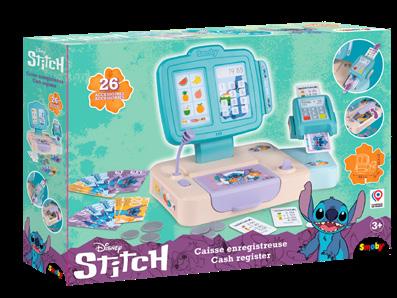


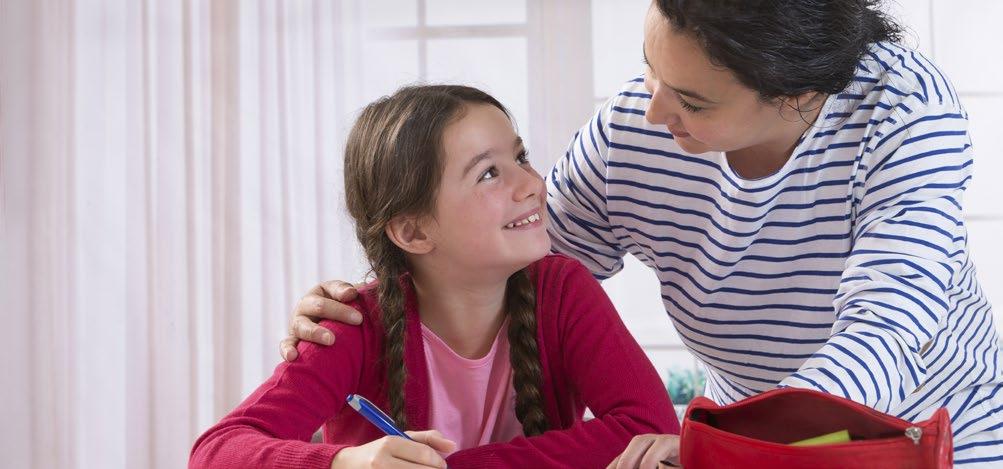
As parents, we naturally want to know our child is doing well at school. Homework often provides the clearest window into their learning. When we support them, we’re also giving feedback, sometimes without realising it. The language we use matters. Focus on their effort, improvements and what they’ve done well. Be specific and encouraging. If needed, gently suggest how they can improve, using kind and constructive language. Thoughtfully worded feedback boosts confidence, builds motivation and helps children feel supported in their learning.
Helping a child with poor processing speed
By Usha Patel
My student Simone is 6 years old and her mum jokingly tells me she has two speeds: slow and slower! Her mum is concerned because the school says Simone’s academics are behind, particularly phonics and reading.
Like Simone, many individuals are affected detrimentally by a slow processing speed. This hinders learning with ease and is one of the things professionals check when testing for neurodivergent conditions
How slow processing affects children
When sounds reaching the brain are not timely, the child either appears not to hear when spoken to or offers a delayed response. It also means they can’t process the sounds fast enough to blend them, which impacts mastering phonics when learning to read.
When visual processing is slow, the eyes do not move easily. Children might compensate by moving their head when reading, which can be tiring.
Slow processing leads to delayed motor control, which in turn, impacts the next developmental stage of fine motor control. This leads to laboured handwriting.
Keeping to time
Temporal processing is the activity of keeping to time within the brain; measuring from microseconds to milliseconds and from minutes to hours. It is responsible for many things including detecting where a sound is coming from (as sound hits one ear microseconds before the other), for waking up, putting the brain to sleep at night and for focusing attention, reading comprehension, remembering information, processing speech, motor co-ordination and other activities.
Helping those with weak or delayed processing speed
Babies and infants automatically learn body (temporal) timing when they learn to move, from feeding to crawling, walking and running. As they move, they activate their temporal processing.
Adjusting the pace of movement impacts temporal processing. Using a metronome (set at 54bpm) to pace activities such as clapping, walking or jumping will add a layer of accuracy to help
The significance of poor processing

A child with dyslexia will typically show three common characteristics: phonological difficulties, weak working memory and poor processing speed. These characteristics aren’t unique to dyslexia; they may also occur independently or alongside other forms of neurodivergence and the combination of these characteristics is often seen in children who struggle academically. Slow processing is especially significant as it often compounds the overall difficulties and affects learning and classroom performance more broadly.

pace and improve those with slow processing. Even when the child stops this timed activity, there will be an increased speed in other areas as a skill transfers. There are many free metronome apps available for smart phones. Working with a metronome for fifteen minutes daily can have a significant impact on improving processing speed.
Therapeutic methods
Interactive Metronome® (IM) is a professional product for those with diagnosed processing difficulties. It helps the brain keep to its internal timing by asking the individual to clap or step to the constant beat of the metronome. Students use touch pads when moving to the beat and the IM software analyses their accuracy and timing to the millisecond. A child uses headphones to listen to further cues and can adjust their pace if they are going too fast or too slow. The programme is gamified and offers a visual element too.
Importantly, the pace at the start is slow and the duration may only be five minutes. However, with carefully adaptive therapeutic sessions, a child slowly increases their temporal processing speed to an optimum level.
Increasing temporal processing speed results in better communication across the brain. When the different parts of a child’s brain communicate better, this improves communication, language, movement, reading, learning and understanding.
Interactive Metronome® has over three hundred research papers. It is an evidence-based programme that can help change the learning outcome for those behind in their studies.
Usha Patel is a Neurocognitive Therapist at Raviv Practice London. She is a qualified Interactive Metronome® provider. For advice on any of these issues, visit www.ravivpracticelondon.co.uk


State, grammar or independent: what’s right for your child?
By Jemma Z Smith
Standing outside three school gates - state, grammar and independent - parents often wonder which will best suit their child. Sometimes the answer seems clear: your child is academic and prefers a competitive environment, your location means that you cannot access grammar schools or your finances rule out an independent school.
For other families, there’s no perfect answer, with compromises being made with each decision to ensure a child has the best possible education for them. Here are three stories which show how different schools can fit different children.
Emma
When Emma began preparing for the 11+, her parents could see her potential - she loved books and thrived on challenges. Grammar school seemed a natural step.
At a school Open Day, Emma lit up while discussing Shakespeare and was inspired by the art posters made by exam students that were displayed in the hall. But fast forward to the first set of practice tests: she scored highly on one subject but was in tears over maths errors. Emma confessed she loved stretching her mind but the pressure felt overwhelming.
Grammar schools offer a rigorous environment in which children choose to push themselves. For some, that same pressure becomes a barrier. I’ve coached students who flourish in grammar school settings and others who benefit more from freedom to explore beyond exams.
Leo
Leo moved from overseas and joined an independent school.
Gifted in rugby and determined to improve his English, he found everything he needed there: English language support built into his timetable, tailored lesson plans when he missed class for rugby tours and elite sports facilities. Such schools often shine in surprising ways - they offer time off for performances, personal tutoring for speakers of other languages and flexibility when young people compete in sport or other areas.
But this comes at a cost, not just in pounds (with fees averaging £13,600 a year across the UK plus the recent twenty percent VAT jump) but in expectations. For Leo’s peers, rugby fixtures on Friday and English essays by Monday became a norm and he had to be able to handle his tightly packed schedule.
Keep in mind that applying to many of the more competitive independent schools also involves preparation for entrance exams.
Mia
Mia’s experience was different: she stayed at her local state school with her friends and older sister.
The school’s £8,210 per pupil funding meant that her teachers were well qualified and she was able to study a wide variety of subjects but after-school maths and drama were wanted and needed. Her parents hired a tutor and enrolled her in a weekend drama group. She grew - at her own pace.
State schooling is inclusive and local but not always specialised. That’s why many families build a hybrid model, tapping into local schools and adding tuition or clubs in areas that need a boost.

They choose this route because it suits their child’s temperament: competitive when needed, supported when they need space.
Of course, this route assumes the quality of your local state secondary schools is high. Eighty percent of schools in the UK are now rated Good by Ofsted but there are still some that fall short. Even if you do have good secondary schools within reach, many have defined catchment areas or priority areas, meaning that if you live within this area, you have a higher chance of getting a place. If you are unfortunate enough not to live in the catchment area of a good school, you may choose to look at alternatives to state education, depending on your circumstances.
Do your homework
Choosing between a state, grammar or independent school isn’t simply a question of reputation or cost; it’s about finding the right environment for your individual child. That means looking beyond league tables and glossy brochures to consider academic pressure, flexibility, value for money and the day-today experience your child will have.
While academic results and facilities often take centre stage, some of the most important factors when choosing a type of schooling may not appear on a school’s website. Parents may not think to ask how a school fits the whole family: will younger siblings be able to join later on? What happens if a school would suit an academic elder child but not a younger sibling who wants to go at a slower pace?
In boarding environments, it’s worth asking whether students stay at weekends or whether the school empties out, which could leave your child feeling isolated.
At all types of day schools, after-school provision varies widely. Does the school offer clubs that genuinely interest your child? If your child has to use public transport or a school bus to get to school, how will this work if they attend an after-school club?
Schools with a large international cohort can offer wonderful diversity but may also not have a large representation from your culture. Practical details like meal arrangements, pastoral support, holiday schedules and homework expectations can also make a big difference to your child’s day-to-day experience and your family’s long-term happiness.
Ultimately, the decision rests not only on the schools themselves but on your child. Ask yourself: does your child enjoy healthy competition and lift themselves up after failure? Or do they build best through small wins and steady encouragement? The ‘right’ school is the one that meets them where they are and helps them become who they want to be, whether it be state, grammar or independent.
Jemma Zoe Smith works with families as an education consultant to help them to school options. For further advice, visit www.educationhotel.co.uk


Assessing a school environment



Choosing a school is a very personal decision and it’s not just about league tables, exam results or facilities. The real question is: in what kind of environment will your child flourish?
Firstly, take a close look at what’s available locally. Some state schools have excellent enrichment programmes and you may be surprised by the range of support on offer. Grammar schools are selective but not always far from home. And independent schools vary enormously - from traditional boarding to creative day schools - so it’s worth considering several.
When touring a school, look beyond the official tour route. Are students engaged or glazed over in classrooms? Do teachers seem stretched or supported? Check the toilets (a surprising window into how a school manages care and discipline).
Choose the environment they’ll be happy and grow in, regardless of the type of school. Remember, you as a parent know your child best and understand their personality, rhythm and levels of resilience.
Understanding a school from one visit
If you can, it’s worthwhile speaking to other parents whose children attend the school.
In addition, as you tour schools, there are usually opportunities to speak to the children that attend and ask about day-to-day school life. Raise the questions you ask teachers with these children too. Children are generally very honest! For this reason, it’s good to visit schools during a normal school day or at an Open Day where you know the school’s students will be present.
How is stress handled during exams? Does the school understand the culture that your children have been brought up with? Are children expected to do homework late into the evening? What is school lunch like and can students sit with friends or are they rushed through? These are all aspects of school life that you may feel it important to understand.
Don’t be afraid to ask practical questions too like: can my child miss lessons for competitions or extra-curricular singing lessons for instance? Are there clubs at lunchtime for those who don’t like sport? If you’re considering boarding, ask what happens at weekends. Do most boarders go home?
Ultimately you are looking for a school environment in which your child will be happy and grow in, regardless of the type of school. Remember, you as a parent know your child best and understand their personality, rhythm and level of resilience.
Call for free code clubs in schools and libraries
The Raspberry Pi Foundation, the UK’s leading digital skills charity, is calling for a free code club in every UK school and library, aiming to equip young people with essential digital skills for a future shaped by AI. An Opinium survey found sixty percent of parents see coding as important, while over seventy say their child isn’t taught coding regularly at school.
Already supporting two thousand free code clubs, the Foundation helps kids learn to code and build confidence, teamwork and resilience. It offers free training and resources which make it easy for anyone, regardless of experience, to start a club.
Teachers have seen code clubs open doors for all students to be creative and collaborative, breaking down stereotypes about who can code. The Foundation’s position is clear: every child should learn to code to shape an inclusive digital world. Code Club has reached two million children worldwide, with a goal of ten million by 2035.
More info: www.codeclub.org
School

School: 25 September
Harrogate Ladies College: 26 September
Ashville College: 27 September
Queen Ethelburga’s: 27 September
The Mount School: 4 October
Queen Mary’s: 4 October
Pocklington School: 11 October
Open days may need pre-booking. Please check before visiting.

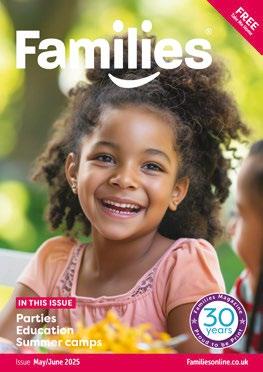
Brackenfield
The importance of music in child development
By Lisa Wander and Catherine Noble
‘Music is a more potent instrument than any other for education because rhythm and harmony find their way into the inward places of the soul.’
This quote, often attributed to Plato, highlights the profound impact of music on a child’s emotional and intellectual development, emphasising its ability to engage the soul in a way that other subjects may not. A core creative subject, it fosters creativity, engagement, cognitive and emotional skills, social skills and self-esteem. Excellent music education opens opportunities that stay with children and shape their lives.
Playing a key role in brain development and impacting various areas of cognitive function, music engages both sides of the brain, thereby improving learning and memory, as well as supporting language acquisition and literacy development.
Songs with rhymes and repetition help develop vocabulary and phonemic awareness. Listening to music and melodies exposes children to a wider range of words and phrases and trains memory skills and recall. Did you know that music is the only thing that stimulates your entire brain? When children can’t hear you because they are concentrating on something else, try singing to them!
Music can have a huge impact on a child’s social and emotional development. It allows children to creatively express emotions which may be difficult to articulate through words alone. As Hans Christian Andersson wrote: ‘Where words fail, music speaks.’ This emotional outlet works on developing empathy

Encouraging a love of music at home
It’s easy and fun to make music a daily part of home life.
Play music regularly, perhaps as a cue for transitions such as bedtime or mealtimes. Set the musical mood for different activities, showing an interest in your child’s musical preferences.
Explore various genres: As well as nursery rhymes, mix up the genres and moods. Make up songs together.
Move to the music: Encourage your child to dance, clap or stomp to the rhythm.
Make your own instruments: Use household items to create instruments, for example shakers and homemade guitars. If your child shows an interest, consider exploring real instruments.
Attend concerts or performances: Live music can be a powerful way to inspire and deepen a child’s appreciation of music.

and emotional intelligence. In addition, exposure to music has been proven to reduce stress and anxiety in children. It creates a calming, positive and engaging environment that enhances overall mental well-being and readiness to learn.
Touching hearts and minds, music is a cornerstone of the broad and balanced education that every child should receive; it celebrates and challenges, it connects and moves us.
In the same way that we teach children literacy and numeracy to prepare them for adult life, we must give them the musical tools they need for a lifetime of music-making and enjoyment. For some, music will be the foundation of a career in one of the country’s most important and globally-recognised industries. For others, it will provide experiences and skills which develop their creativity.
For many, music will simply be a source of joy, comfort and companionship throughout their lives.
Lisa and Catherine are co-founders of Emparenting (www.emparenting.co.uk), supporting children, parents and families with the insights, skills and tools needed to nurture the development and well-being of the next generation.

Positive effects of music on the brain
Music offers children a unique lens through which to explore cultures, traditions and even history, helping broaden their perspective and understanding of the world around them.
Musical rhythms introduce basic mathematical concepts, for example sequencing and analysing patterns. Research shows a strong correlation between musical training and improved mathematical abilities.
Activities like clapping, dancing and playing musical instruments require the integration of hand, eye and auditory co-ordination which improves fine and gross motor skills.
Musical improvisation, composition and interpretation all foster innovative thinking and problem-solving skills, crucial for overall intellectual growth.
Performing music nurtures self-confidence and provides a sense of achievement, particularly when children have the opportunity to perform in front of an audience.
The Quality Time revolution: building a more connected family
By Rachel Jones
How many of us suffer from chronic over-scheduling?
Demanding jobs, childcare, school runs, social and extracurricular commitments leave little space for family life. On average, we devote less than half an hour’s quality time to our child each day. If they’re also spending a lot of time unsupervised on screens, it’s no wonder that parent guilt is very real.
Time spent on social media tends to compound that guilt. While giving us a big dose of the addictive hormone dopamine, it can also trigger feelings of inadequacy or emptiness. By contrast, oxytocin (the ‘love hormone’) is released during simple social interaction. It peaks during childbirth but plays a crucial role throughout life in family bonding and parent-child relationships.
I’m a great believer in encouraging lots of ‘offline’ activities. It doesn’t matter what - paddleboarding, cake decorating, wood whittling, drawing. Don’t just watch from the sidelines, join inshared play is excellent for adults too!
If you have two or more children and can manage ‘us’ time with each individually, it’s powerful. Regular, focused attention builds children’s self-esteem and reduces negative attention-seeking behaviour. Involve your child in everyday routines like cooking or gardening or create special rituals like a weekly games night or sharing a TV series.
When it comes to time spent with our children, quality invariably trumps quantity. According to bestselling author and pastor, Gary Chapman, quality time is one of a human’s five love languages. Simply making time for each other means more than words or gifts ever could.
The dinner table can be a powerful place for open connection, active listening and sharing opinions. Use mealtimes to

Quality tween time
The teen years steal the limelight but your child will need extra support between ages 8 and 12. It’s a time of huge emotional and social development as their bodies change and hormones undergo a big surge. Pressures pile in and selfesteem can be shaken.
When you as a parent feel pushed away, it can feel hard to encourage quality time without invading your child’s space. Don’t take their anger or frustration to heart – it isn’t aimed at you. Listen, REALLY listen, calmly and with empathy. Show you’re on their team and make them feel ‘seen.’
Give them more space but also express your love through tiny acts. A little message on their mirror, a note in their lunchbox or leaving a flower in their room can be really a simple way of connecting when life is busy.
Simple age-appropriate activities to enjoy together could be a home spa night, bike ride or café trip. And don’t feel you need to fill every silence either – sometimes just being together, quietly content, is more than enough.

celebrate achievements and ask open-ended questions. The following simple gratitude practice can be very effective; each person has to name their rose, thorn and bud from the day or week:
Rose: what was a highlight and what are you grateful for?
Thorn: what didn’t go so well?
Bud: what are you looking forward to?
By prioritising quality time with our children, we build stronger bonds and foster emotional wellbeing. Simple moments around the table or sharing activities have a profound impact on our relationships. Putting down devices and being present with our children will reap the rewards of a more connected family.
Rachel is the proprietor of Re:treat (www.retreat.me.uk) which runs family wellness retreats and parent and t(w)ween spa days in West Berkshire, providing parents and children with a unique opportunity to connect and enjoy new experiences together. Follow @retreatberks on social.

Sideways listening
Some children feel uncomfortable and clam up when you try to talk while staring into their eyes. When the words aren’t coming face-to-face, you could try sideways listening – starting a conversation when you’re side by side, such as in the car or on a walk. It also works well when you’re both absorbed in an activity together like arts and crafts, chores or cooking. It’s perfect at bedtime after lights out.
This approach can feel more natural and less intimidating, making it easier for your child to initiate conversations or share difficult topics. The lack of intense eye contact can create a more relaxed space for them to talk about anything that might be worrying them. You may be surprised how much children share when they feel less pressured.
The secret is actively listening and letting your child lead the conversation while you comment more than question.
Set up this routine in early childhood and you’ll be laying the foundation for a healthy and open relationship into the teen years and beyond.
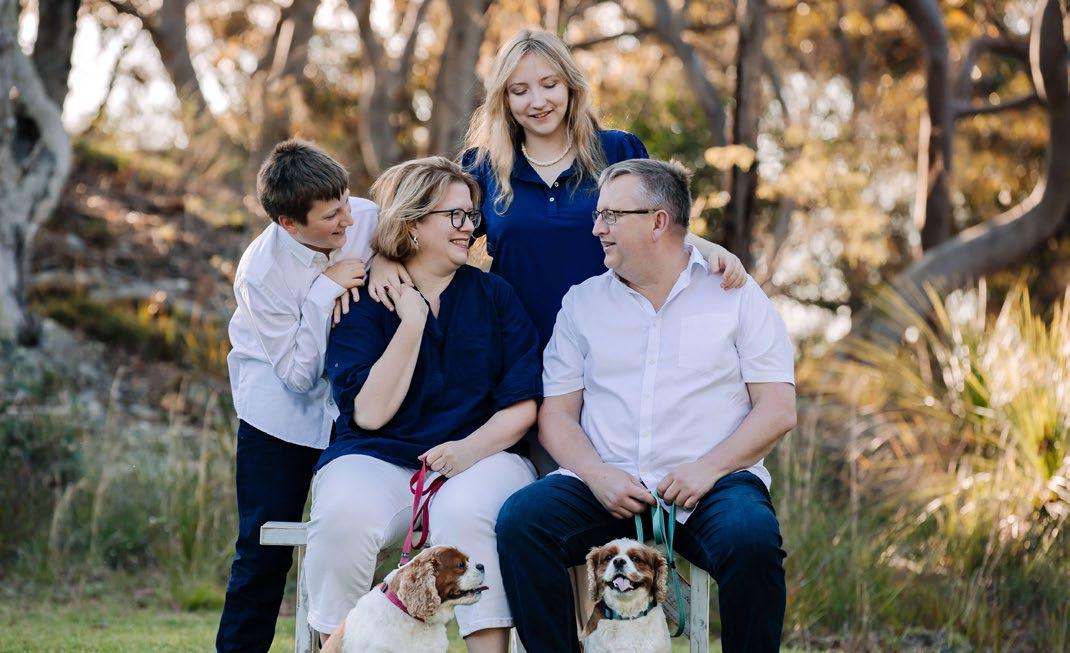
A Historic New Chapter at Pocklington School
This September, Pocklington School welcomes Becky Lovelock as its new Head, bringing with her global experience and a warm, grounded vision. Currently Deputy Head Academic at Sydney Grammar School, Becky brings a deep commitment to holistic education, shaped by a career across continents and diverse school communities.
Her appointment marks a historic milestone as Pocklington’s first female Head in over 500 years. “I hadn’t realised the historic significance at first,” she says, “but I’m proud to be the first woman in the role, and I hope not the last.”
Drawn to Pocklington’s unique blend of tradition and forwardthinking values, Becky believes in collaborative leadership and the power of inclusive, socially aware education. She describes herself as calm, reflective, and inspired by the quiet strength of her family.
As she begins this new chapter, Becky brings not only experience but a clear vision for empowering young people to lead with confidence, kindness and purpose.
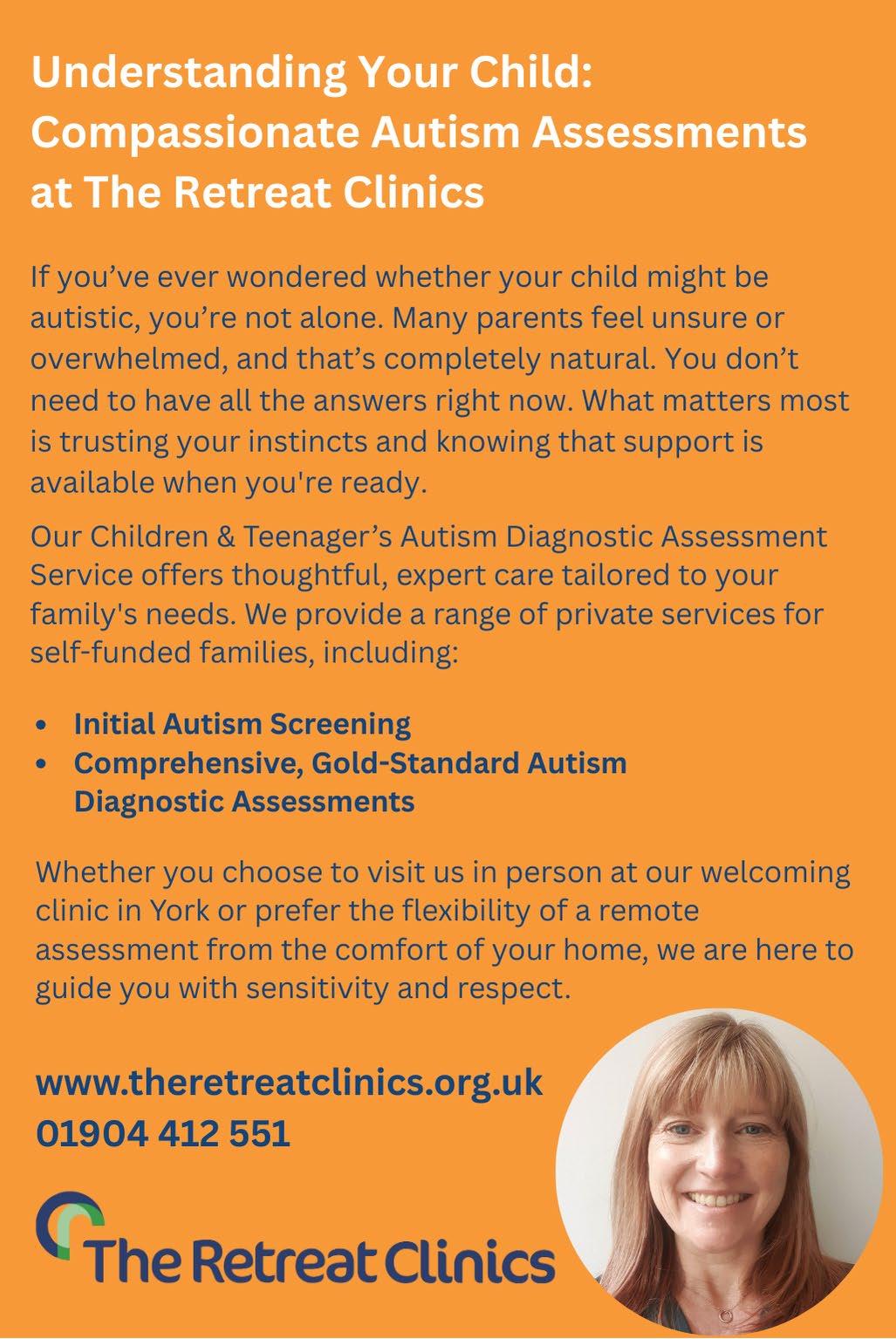

Why Brackenfield School is the Ideal Start for Your Child’s Education
Brackenfield School offers an exceptional Nursery and Reception experience that lays a strong foundation for lifelong learning. Nestled in the heart of the school, the Nursery provides a safe, nurturing, and stimulating environment for children aged 2 to 4 years. With expert staff guiding the Wrens (2 to 3 years) and Robins (3 to 4 years), children thrive through creativity, discovery, and play and are fully prepared for the next stage of their education.
What sets Brackenfield apart is its holistic approach. Children enjoy a rich curriculum that includes outdoor learning, literacy, numeracy, music, P.E. and even weekly French lessons with specialist teachers. The school’s wraparound care offers flexibility for busy families, with extended hours and homecooked lunches included.
Rated ‘Excellent in all areas’ by the ISI, Brackenfield ensures a smooth transition into Reception, where confidence and curiosity continue to flourish. With outstanding facilities and a warm, community feel, Brackenfield School is the perfect place for your child to begin their educational journey.
Families are invited to visit the school on its Open Day on Thursday 25th September; book a place by emailing admissions@brackenfieldschool.co.uk
If you have some news to share, please email it to editor@familiesnorthyorkshire.co.uk
Get ready for a spooktacular time in the kitchen with this fun and frightfully fantastic book!
Families is giving five lucky readers the chance to win a copy of My First Halloween Cook Book by David Atherton, winner of The Great British Bake Off and beloved children’s cookbook author.
Packed with playful, easy-to-follow recipes perfect for little hands, this colourful book is full of spooky snacks, creepy cakes and ghoulishly good ideas to get kids excited about being in the kitchen. Don’t miss your chance to win!
Closing date: 17 October T&Cs at www.bit.ly/mfcbtcs


Divorcing with Older Children: Legal Considerations and Emotional Realities
by Katie Audsley, Family Lawyer – Hartlaw LLP
Divorce is never easy, but when children are older - teenagers, young adults, or even grown and out of the house - the emotional terrain shifts in subtle yet profound ways. While many assume older children are more resilient or less affected, the truth is that divorce can deeply impact them, just in different ways than it does younger children.
When parents divorce, the legal system often focuses on the welfare of minor children. But what happens when the children are older - there are legal nuances worth understanding.
Financial Support Obligations
Even after a child turns 18, some financial responsibilities may continue:
• Child maintenance: In the UK, child maintenance usually ends at 16 or 20 if the child remains in full-time education (not higher education like university).
• University costs: While not legally mandated, courts may consider educational expenses in divorce settlements, especially if parents previously agreed to support higher education and it is something that should be considered.
• Trusts and inheritance: Divorce may affect estate planning, wills and trusts that involve adult children.
Living Arrangements and Property
Older children may still live at home or return during holidays.
Considerations include whether it is feasible to keep the family home so that the children can return there, whether it is necessary to provide two homes for the children and what that might look like in terms of needs.
Legal Tools and Agreements
Legal Instrument Purpose
Consent Order Formalises financial agreements on divorce.
Parenting Plan Useful for teens under 18, or older children who are not fully independent - to outline expectations, logistics and arrangements.
Will / Estate Planning It is a good time to look at reviewing or making a will and considering planning for children now the circumstances are changing.
Rebuilding Together
Divorce marks the end of one chapter, but it doesn’t mean the end of family. With intentional effort, families can evolve into new forms of connection and support. Older children may eventually come to appreciate the honesty and courage it takes to make difficult decisions—and may even grow closer to both parents in the process.
Seek Professional Guidance Early: Consulting with legal representatives or financial advisors from the outset can help clarify expectations, reduce misunderstandings and prevent conflicts.
If you require any advice or assistance in relation to any aspect of family law, please do not hesitate to contact us. Dianne, Kate or Katie in our family team offer a FREE initial consultation.
Call 01937 547000
Email info@hartlaw.co.uk www.hartlaw.co.uk

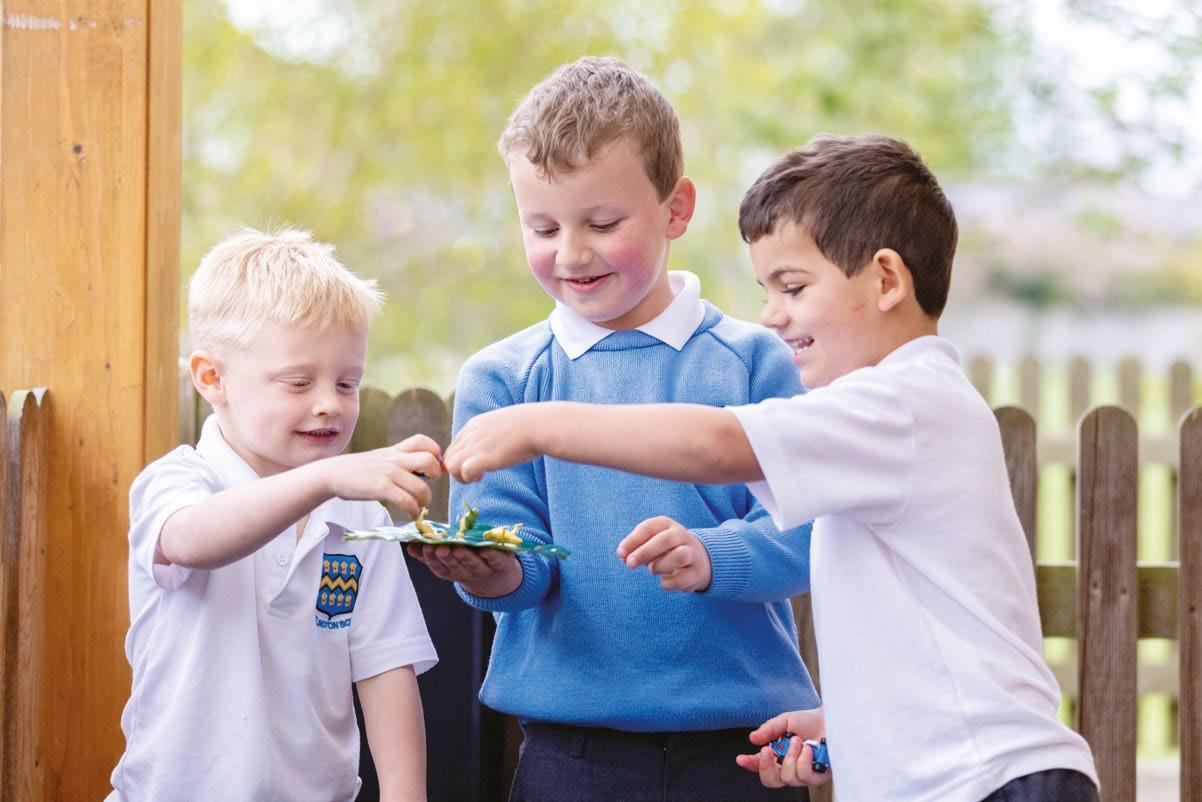

Balancing Law and Emotion
Legal clarity is essential, but so is emotional sensitivity. Older children may feel overlooked in the legal process, even as they grapple with shifting family dynamics. Parents should strive to:
• Communicate openly about legal changes that affect them
• Reassure them that family bonds remain intact, even if the legal structure changes
• Model respectful conflict resolution, which can shape their own future relationships
Pocklington School’s renowned emphasis on pastoral care as part of an individually focused education ensures pupils feel valued and grow in confidence. Right through from Prep School, with its emphasis on nurturing children’s natural curiosity, imagination and enthusiasm for learning, to the Sixth Form, where independent thought is prized, our pupils are encouraged to be resilient and resourceful learners. We look forward to extending a warm welcome to you and your family.

Hartlaw Solicitors
Developing your preschooler’s literacy through play
By Sophie David
With early education reform continuing to evolve in the UK, there’s increasing focus on HOW children learn, not just what they learn. As the Early Years Foundation Stage (EYFS) continues to shift towards child-centred approaches, it’s essential to remember that play is not a distraction from learning; it IS learning. Especially in the early years, children make sense of the world, build language and develop communication through rich, hands-on, joyful experiences.
Young children thrive in environments that are safe, stimulating and full of opportunities for exploration. Whether it’s splashing in puddles, baking biscuits or chatting before bed, these reallife experiences are the true foundations of literacy. They spark curiosity, support social and emotional development and help children build the confidence to express themselves. Worksheets and screens have their place but they can’t replace the depth of learning that happens through meaningful, playful interaction.
Confidence before letters
Before children can read or write, they need to feel confident in their thoughts, their voices and their ability to make sense of what they see and hear. Literacy begins long before the first book is opened or pencil is held, it starts with expression and connection. When a child feels that their ideas matter and someone is listening, they become more motivated to communicate.
That’s where play shines. Whether they’re going on a ‘sound hunt’ through the house, forming letters in flour or retelling a favourite story with puppets, children naturally explore language through creative play. These playful moments lay the groundwork for phonemic awareness, vocabulary growth and narrative understanding, essential components of early literacy. Importantly, these skills develop in ways that are meaningful, relevant and fun for young learners.
From screens to scenes
In today’s world, screens are a reality for most families. However, passive screen time can limit children’s opportunities to engage in back-and-forth conversation, imaginative play and independent thinking. The goal isn’t to ban screens entirely but to find a healthy balance.
Real-world, interactive experiences offer far richer learning. A trip to the park, helping to write a shopping list or building a cardboard post office provides children with valuable vocabulary,
Creating a language-rich home without pressure
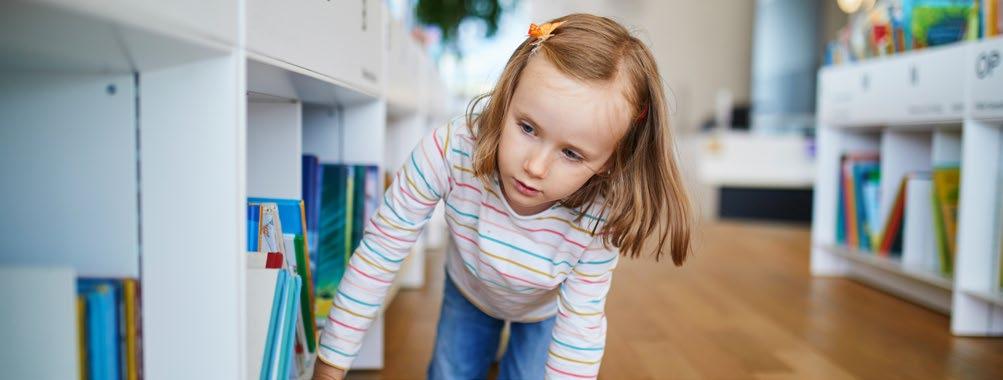
Keep books within easy reach in every room to encourage independent exploration.
Label toy boxes with pictures and words to support natural word recognition.
Talk through daily routines to build vocabulary and sentence structure.
Ask open-ended questions like: ‘What happened in your game today?’ to inspire storytelling.
Use everyday tasks, like setting the table to explore colours, shapes and actions.

opportunities to problem-solve and space to imagine. These everyday experiences are filled with chances to use language with purpose, something even the best-designed app can’t fully replicate.
Conversations that count
One of the most powerful tools in developing early literacy is something every parent has: conversation. Talking with your child throughout the day helps develop both expressive (what they say) and receptive (what they understand) language. The more words and ideas children are exposed to, the more prepared they’ll be for future reading and writing.
These conversations don’t have to be elaborate. Describe what you’re doing as you cook. Ask your child to name objects as you tidy up. Tell stories about your day while on a walk. Encourage your child to share their thoughts, ask questions and invent stories. These interactions build vocabulary, deepen comprehension and foster a love for language.
Back to basics
Supporting your child’s literacy development isn’t about flashcards, early readers or academic pressure. It’s about tuning into their natural curiosity and providing rich play and connection opportunities. When children are given time and space to explore the world, guided by a caring adult, they become confident, capable learners.
As the EYFS framework continues to develop, let’s stay focused on what truly matters: play-based, relationship-rich learning. It’s in the pretend tea parties and the muddy outdoor adventures that real literacy begins.
Five easy ways to support literacy at home
Go on a daily sound scavenger hunt to explore phonics. Read the same book in silly voices to build expression and intonation.
Bake together, talk through steps and write a menu or shopping list to show how we use reading and writing.
Form letters with playdough or sand to strengthen fine motor skills for handwriting.
Sing nursery rhymes and invent new verses; this boosts phonological
Sophie David is the author of READ, WRITE, PLAY: 100 Easy Ways to Make Phonics Fun for Children Aged 3-7. Available in hardback (£22, Robinson).
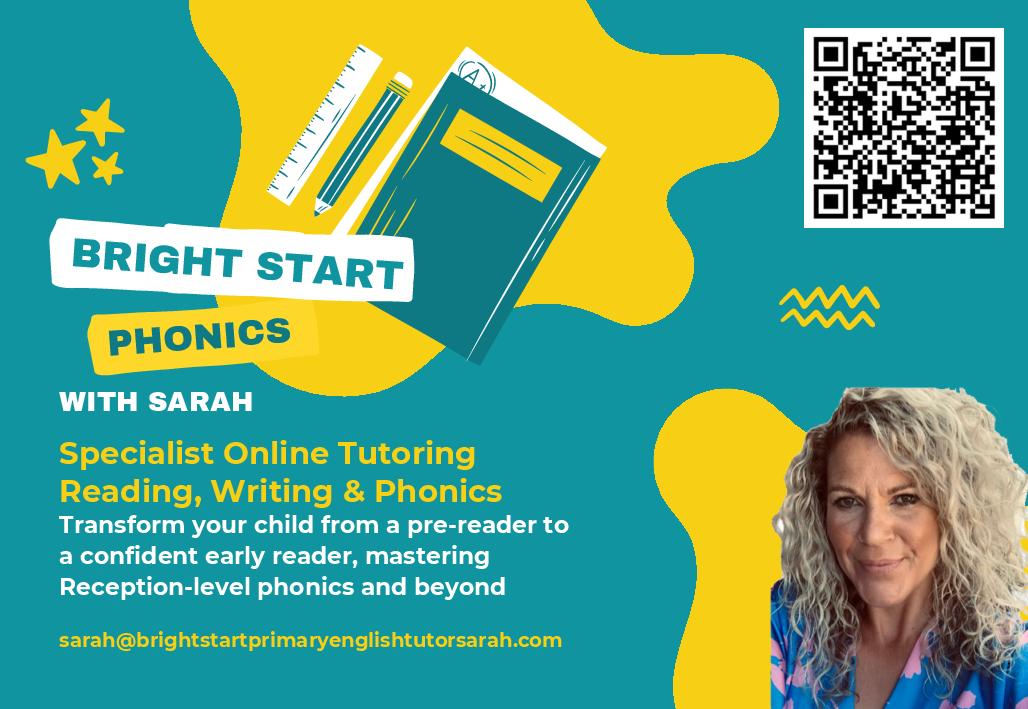
Clubs & Classes Directory
If your kids are wanting to get active, desperate for drama, eager to meet new friends or learn a new skill, then look no further than our guide to local clubs & classes to keep them busy!
Number Train

Number Train is a fun and interactive introduction to maths for preschool children designed and delivered by an experienced primary maths specialist. With a different theme each week, sessions keep your child engaged with games, action songs, arts and craft.
Call 07852 989523 numbertrain@hotmail.com
Sunshine Sensory
Baby Swimmers

Classes for babies and toddlers from 6 weeks old. Your little ones will have a great workout, singing and playing through our structured awards programme to build water confidence and progress to a confident swimmer.
info@babyswimmers.co.uk

A unique and enriching experience that engages all your little ones senses while promoting relaxation, enhancing well-being, and creating memorable moments. Visit the website to discover how you can begin your little one’s sensory journey today! www.sunshinesensory.co.uk
2PRU Gymnastics Club:
An inclusive community where fun, family and a sense of belonging thrive.
ARTventurers:
Award-winning, colourful, creative (often messy) art classes for babies, toddlers and children.
Baby Band:
Interactive music session for children who are independently sitting to 3 years old.
Kidslingo:
Inspiring young children, from birth to 12 years, to love languages (French and Spanish) from the very start of their language learning journeys.
The Little Gym:
For every stage of your child’s development from 4 months to 12 years.
Perfect Pitch Stars: Classes include singing & drama in a fun and exciting environment.
Phonics with Robot Reg:
High-energy classes which open a world of literacy to children and teach early phonics skills. Ages 3 months to 6 years.
Razzamataz:
York based classes in Performing Arts - singing, dancing & drama for ages from 2 to 18 years.
Rhythm Time:
Music and singing classes for babies, toddlers & pre-schoolers.
Ruby Dance Studios:
Inspiring, confidence-boosting & creative dance classes for children aged 2 to 11 years.
Swimmers Academy:
Classes for beginners from 4 years old through to advanced levels for teens.
Tumble tots:
Gym classes for children from 6 months to 7 years.
Water Babies
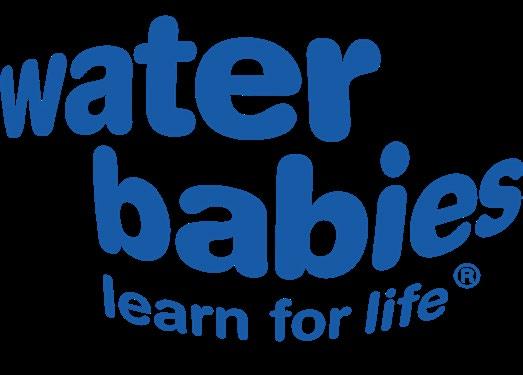
Learn a skill for life with the UK’s leading provider of baby and toddler lessons! Develop swimming strokes, water safety and core aquatic skills within a fun, multisensory learning environment that builds social, emotional, physical and language skills. Taught by Level 3 pre-school swimming qualified teachers across North Yorkshire. littlefish@waterbabies.co.uk 01423 457000 www.waterbabies.co.uk/babyswimming/yorkshire-north
Youth theatre class for children aged 5+.
Don’t forget to say you saw these listed in Families North Yorkshire Magazine.

York Theatre Royal Youth Theatre:
Your family guide to What's On

Filey Kite Festival
Filey Brigg Country Park
The annual Filey Kite Festival is brought to you by the Northern Kite group and North Yorkshire Council. Partnering with the Filey Food & Drink Festival to bring flavours of the world. The event offers spectacular views across Filey, with some record breaking kites, and fantastic displays.
Peppa Pig at Thornton Hall
Thornton Hall Country Park
OINK-TASTIC NEWS! Peppa Pig & George will be making appearances at intervals throughout the day at Thornton Hall Country Park for a day of muddy puddle fun! Don’t forget to bring your wellies and your camera.
Nidderdale Agricultural Show
Bewerley Park Show field, Pateley Bridge
‘Pateley Show’, as the Nidderdale Show is affectionately known, is a traditional Dales agricultural Show. Taking place in the beautiful surrounds of Bewerley Park, visitors can browse a wonderful display of the finest livestock, produce and crafts that the Dales has to offer. The Nidderdale Show traditionally marks the end of the agricultural show season.
Great Yorkshire Pumpkin Patch
Monk Park Farm
Wander through the magical pumpkin patch, pick your perfect pumpkin, snap some autumn photos, and enjoy all the festive vibes at your own pace. Check the website for available dates.
Spilmans Pumpkin Festival
Spilmans Farm, Thirsk
Make memories in the pumpkin patch – there is fun for everyone. Can you find the location of the special photo opportunities dotted all over the farm? Check the website for available dates.
Pumpkin Picking at Thornton Hall
Thornton Hall Country Park
Head into the rustic pumpkin patch to pick your perfect pumpkin!

If you’re looking for places to visit and things to keep the kids entertained this Autumn, then our What’s On guide is packed full of ideas for places to take the kids, whatever the weather, day’s out, local events and shows.
Pumpkin Patch Trailer Tours
Lotherton Hall
Hop on the Pumpkin Express and take a ride up to the secret pumpkin patch. Take part in craft activities, enjoy refreshments and pick up that all important pumpkin before the big day.
SPOOKS! at Thornton Hall
Thornton Hall Country Park
The ghouls and spooks of Mischief Manor are getting ready for their biggest night of the year — the Monster Mash Party! But with so much to do and so little time, they need your help. Check the website for available dates.
Web’oween
The Web Adventure Park
Head to The Web Adventure Park this half term for pumpkins, rides, entertaining and so much more! It’s a great day out for the whole family. Check the website for available dates.
Battle of Byland Anniversary Event
Sutton Bank National Park Centre
Another exciting line up for this year’s annual Battle of the Byland event! Plenty of activities to keep the children entertained.
Halloween Toddler Party at Thornton Hall
Thornton Hall Country Park
Spooktacular fun for little pumpkins – games, giggles and a pumpkin patch full of magic.
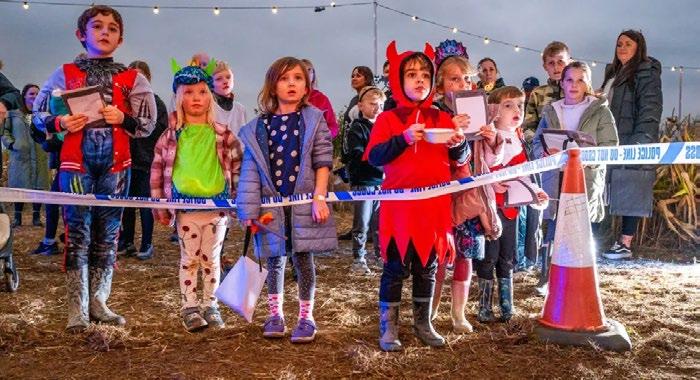
Trick or Treat Street
William’s Den
The ultimate immersive Halloween experience designed to bring all ages together for some spine-tingling fun. From Monster Mash Mini Discos to Teen Scream thrills and spooky adultonly scares.
Hallowtween
York Maze
Calling all fearless 10–15-year-olds and adults of a more nervous disposition... Venture into a new dimension of spine tingling fun this Halloween. You are invited to explore 4 of the farm’s most mysterious buildings, each with its own twisted history you will discover for yourself once you step inside.
Halloween Half Term Fun!
Eden Camp
Get your spook on this October with some family friendly activities and workshops. Search the camp for spooky characters in our Halloween Bingo hunt! Find them all and claim your sweet treat from the Gift Shop!
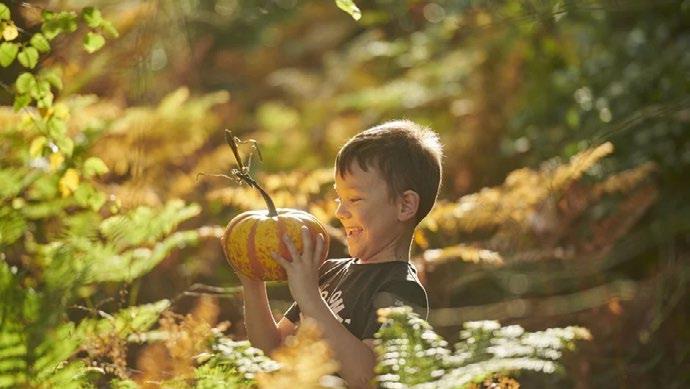
The Secret Life of Pumpkins
RHS Garden Harlow Carr
Join the staff at RHS Harlow Carr for a week of pumpkin inspired activities, creativity and adventure in the gardens!
Wizard Academy
Monk Park Farm
Looking for a full day of Halloween magic? Why not join the Wizard Academy! This all-day adventure includes farm admission, spooky-themed activities, interactive wizard training, animal encounters, and loads more. A spellbinding day out for witches and wizards!
Spooky Skeletons: Scarytales
Lotherton Hall
From Snow White’s eerie encounter with the poisoned apple, to Little Red Riding Hood’s perilous journey through the woods and a mad hatters bone-chattering tea party in Lotherton Hall, enjoy a fun and spooky exploration of Lotherton - perfect for all the family.

Halloween Hauntings
Temple Newsam
This Halloween you are invited to meet the past residents of the estate including the notorious Blue Lady. See the house and farm dressed up and enjoy creepy crafts. Explore the house to discover its hidden histories and hear tales of spooky goings on and don’t forget to dress up in your best Halloween costume.
Halloween Half Term
Whitby Abbey
Enjoy a ghoulishly good day out at Whitby Abbey this half term. Follow the quest to solve creepy clues and listen to spooky stories.
Pumpkin Trail 2025
Bolton Abbey
Navigate your way through Strid Wood following the giant pumpkins! Keep your eyes peeled for clues hidden in the mystery boxes along the way to help solve the puzzle!
Junior Ghost Walk
Temple Newsam
Experience the magical mysteries of Halloween without any of the frights, as you dip into the cauldron of silly tales with plenty of fun too.
Family Halloween Evening
Bolton Castle
A fun and spooky special Halloween evening for younger visitors from 4.30-6.30pm.
Family Theatre
The Little Mermaid
Joseph Rowntree Theatre
Ariel, King Triton’s youngest daughter, wishes to pursue the human Prince Eric in the world above and bargains with the evil sea witch, Ursula, to trade her tail for legs. But the bargain is not what it seems and Ariel needs the help of her colourful friends, Flounder the fish, Scuttle the seagull and Sebastian the crab to restore order under the sea.
Counting Sheep Junction Goole
Snuggle up and join two sheep on a journey through the joys and frustrations of everything bedtime. A touching, musical adventure filled with sensory play, for 0–3-year-olds and their (very tired) grown-ups.

The Wizard of Oz Grand Opera House, York
As Dorothy navigates the enchanting landscape of Oz, she is closely watched by Glinda, the Good Witch as the Wicked Witch of the West is plotting to thwart Dorothy’s quest and reclaim the magical ruby slippers.
The Tale of the Loneliest Whale
York Theatre Royal
Just when Whale is about to give up, a mysterious voice echoes through the waves. Determined to find the singer, Whale embarks on an unforgettable
adventure - diving through glowing coral caves, dodging wibbly jellyfish and facing wildeyed sea monsters! But will he ever find a friend who hears his song?
Hocus Pocus - Live Experience
Joseph Rowntree Theatre
Join the Sanderson Sisters for a wickedly fun, family-friendly theatre experience like no other! Hocus Pocus: Live Experience brings the beloved movie to life with singing, dancing and all your favourite songs from the film. Packed with games, spooktacular prizes and magical surprises, this interactive show gets the whole audience involved from start to finish. Help the sisters brew their mischievous potion and become part of the spellbinding story!
Magic Mike: Not So Spooky Halloween show Bridlington Spa Join Magic Mike and Count Chuckula for a magical Panto style show full of messy ghostly fun for the whole family. Bat, Cackle and Pop! York Theatre Royal
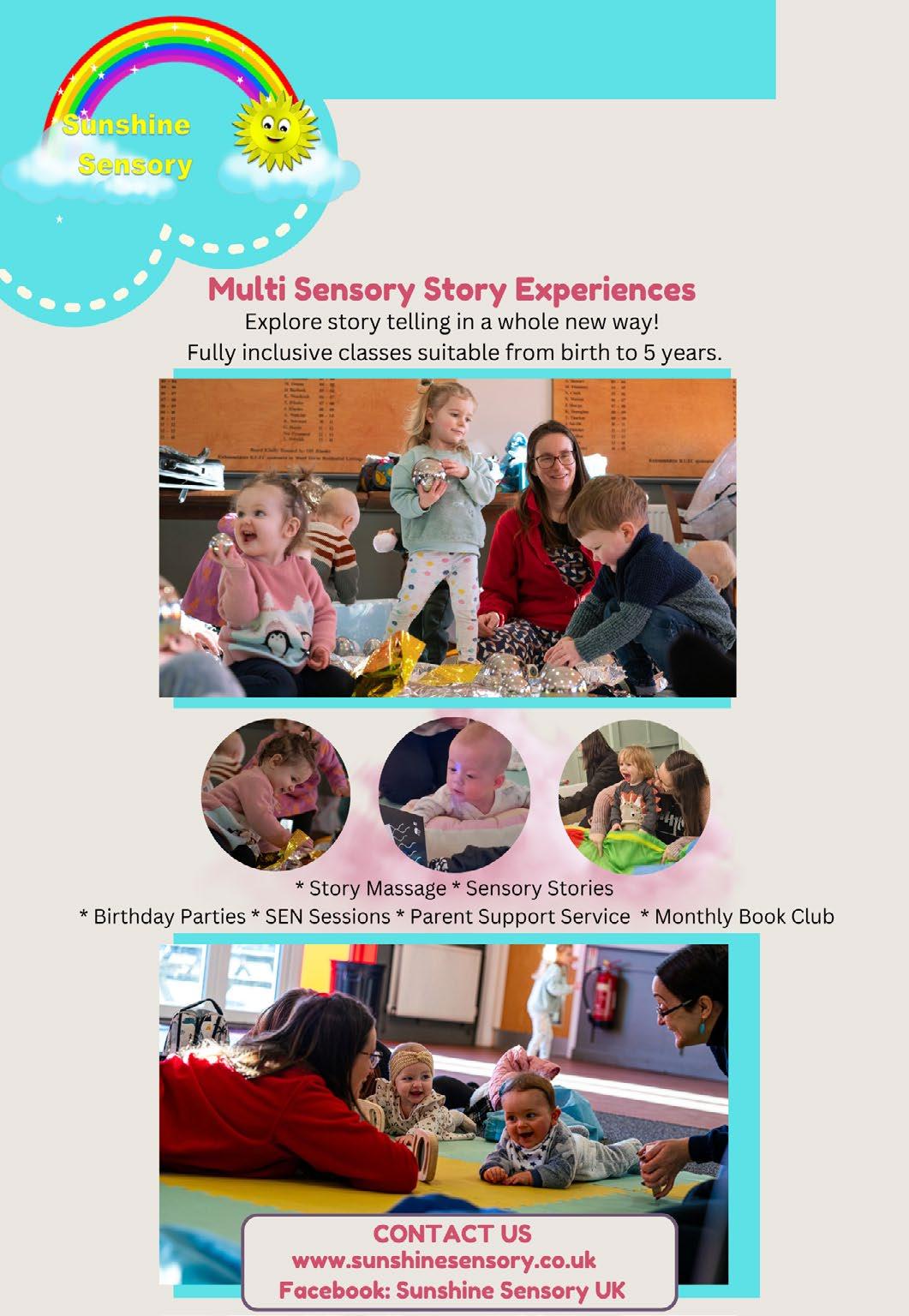

It’s Winifred the Witch’s birthday, and she thinks everyone has forgotten. There’s going to be one big surprise party, but first, we need to make a special birthday cake.



Learning





Make Skull Cupcakes for Halloween
Cupcakes are usually round but with a clever trick we can make them skull shaped. If you want to be very fancy, you can get some tubes of coloured icing and decorate your cakes with colourful patterns.
Top tip: it’s important to use really ripe bananas for this recipe because they’re soft and sweet. The best ones are brown or almost black.
Ingredients
Cupcakes:
2 ripe bananas (peeled)
100ml vegetable oil
¼ tsp grated nutmeg
50g caster sugar
50g soft brown sugar
120g self-raising flour
½ tsp baking powder

Step 1
Preheat oven to 180°C (fanassisted).

Step 5
Fill each cupcake case threequarters full. Gently push a baking bean (or scrunched-up ball of foil) either side of the case. Bake for 15 minutes, until golden.
Step 9
Break up the flaked almonds and add little pieces to each skull for the teeth.
Makes 12 cupcakes
Decoration: 150g icing sugar
½ tsp vanilla extract
24 raisins
2 tbsp flaked almonds


DAIRY FREE



Step 2
Fill a 12-hole cupcake tray with 12 cupcake cases.

Step 6
For the icing, mix together the icing sugar and vanilla, then add a tablespoonful of water at a time until you have an icing that is pourable.



Step 3
Add the bananas, oil, nutmeg and sugars to a jug and whizz with a stick blender until smooth.

Step 7
Dollop a spoonful of the icing onto the cake and spread to the edges.







Step 4
Pour the mixture into a mixing bowl. Add the flour and baking powder and mix until smooth (do not beat).

Step 8
Gently squeeze each raisin between your finger and thumb until soft, then place on the cakes for the eyes.
With thanks to David Atherton, winner of The Great British Bake O 2019 for this recipe, which is featured in his new book My First Halloween Cookbook, part of the My First Cook Book series, available online and from all good book shops now.
©Walker Books 2025. Text © 2025 Nomadbaker Limited. Illustrations © 2025 Jess Rose. All rights reserved.

